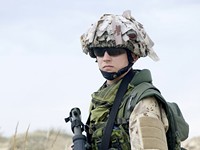[
{
"name": "500x250 Ad",
"insertPoint": "5",
"component": "15667920",
"parentWrapperClass": "",
"requiredCountToDisplay": "1"
}
]
Prepare for a long war
A retired general stays on the attack
Retired Army Major General John Batiste has lived in Rochester for less than a year, but his outspoken criticism of Secretary of Defense Donald Rumsfeld has quickly made him one of the area's most well-known residents.
Batiste, who moved to Rochester to join Klein Steel in November 2005, served in Iraq twice, most recently in 2004 and 2005, when he was commanding general of the First Infantry Division. He also served as an assistant to Paul Wolfowitz when Wolfowitz was deputy defense secretary.
One of a half-dozen retired generals who have criticized the Bush administration's handling of the war in Iraq, Batiste has called repeatedly for Rumsfeld's head. He was in Washington on Monday, testifying at a hearing on the war, hosted by Senate Democrats.
In a recent appearance at the Rochester Public Library, he repeated his criticism --- and tried to quell a few rumors: He isn't running for office. He's not a Democrat; he's a registered Republican. But he won't vote for "uninformed" Republicans out of loyalty to the party, he said, pointedly referring to Upstate Representative Randy Kuhl, who is seeking re-election in November.
In an interview last week, Batiste said that Rumsfeld had "cherry-picked" intelligence to justify an invasion of Iraq. He said the public must prepare for a protracted war. And he charged that Congress has not held the Bush administration accountable for its conduct related to the war --- and that the public has not held Congress accountable.
The following is an edited version of that interview with Batiste. (A previous City interview, "A Question of Competence," was published April 26, 2006, and is available online at www.rochester-citynews.com.)
Batiste will speak at 7 p.m. Thursday, October 5, at NazarethCollege's Linehan Chapel, GolisanoAcademicCenter, 4245 East Avenue. Tickets are $30; call 389-2472 in advance, since they will not be available at the door.
You have been speaking out on the Iraq War for about a year. What has changed in that period?
It has taken about six or seven months, but I think the biggest thing is that on Monday [September 25], for the very first time, our Congress is holding a committee hearing with people like me to start figuring out what is really going on in Iraq. I will be testifying in an open hearing.
This is huge. Up until this point, Congress has been silent. They have abrogated their oversight responsibilities. In previous conflicts --- World War II, Korea, and Viet Nam --- there were hundreds of committee meetings where our elected officials were delving into the facts, asking the tough questions: Why did we go? Did we go with enough capability? Are we spending the money in the proper way? I mean, there are a thousand questions that need to be asked.
This is a big step forward in understanding this war.
You've said that Donald Rumsfeld threatened to fire anyone who asked about a plan for peacekeeping.
It's documented. Army Brigadier General Mark Scheid was one of the planners. He made his statements in September. Anyone can Google them and find them.
[Scheid stated that Rumsfeld did not want any planning for additional troops or occupation because the "American public will not back us."]
In your talk at the library, you said that in the lead-up to the war in Iraq, your office was next to Wolfowitz's and Rumsfeld's and you heard them trying to find proof to justify their main objective, which was to invade Iraq. Can you say more about that?
I can say Donald Rumsfeld worked very hard to connect the dots between Al Qaeda and Saddam Hussein. He had his own intelligence-gathering office, which cherry-picked the intelligence in order to draw the conclusions that Donald Rumsfeld wanted to draw.
When was this?
It started right after 9/11. It was in 2001 and 2002.
And your office was next to theirs in the Pentagon?
I was in proximity to observe this going on.
What was your reaction? Were you able to understand what was happening? At that point, were you able to connect the dots?
No. At that point, I could not. I was skeptical, but there was still the possibility that this link existed. As time went on, though, I and others began to realize that this linkage didn't exist. And it never existed. We went to war on false pretenses. We were misled. We were badly misled.
You've been away from Iraq for awhile. When you talk to friends and soldiers who are still there, what are they telling you now? Are things improving?
Things are worse. There is a huge sense of frustration. And at least part of that frustration comes from the sense that it didn't have to be this way. We've squandered our great military. We went to war with a terribly flawed strategy.
An increasing number of people say Iraq is in some type of civil war. What does the goal become in the context of a civil war? Who is the enemy?
It's a really good question. But I don't think we're prepared to answer it. There are things we need to do to get to that answer.
We need to rethink our entire strategy, from start to finish. We need to get rid of Donald Rumsfeld. The truth is he doesn't know how to win. His judgment is terrible. We need a leader who the military can trust, who has the instinct and judgment we can trust.
Then we need to do something else: we need to mobilize this country for a protracted war. This country has never been mobilized. We are fat, dumb, and happy. Our country really doesn't understand what it has gotten itself into.
The question I asked the other day is: Can you fight a secret war in a democracy? And the answer is: No, you can't.
You've said that we need to finish what we started, but what does that mean? How would you define victory in Iraq?
That's the great question that hasn't been answered. And that's why I say we need to review our entire strategy. It is a very tough question.
You said we went in with only one-third of the troops we needed. That would mean we would need troop levels --- just in Iraq --- at somewhere around 300,000.
It's 350,000 or more. And on top of that, we need the Iraqi security institutions [police and military]. That's what has tied our hands and made it difficult to control the insurgency.
You know our troop readiness and distribution. Where would extra troops come from?
Right now, we have a real problem. They don't exist. The National Guard is all but non-combat-ready. And our active Army is overcommitted --- rode hard and hung out wet.
It would cost right now --- if we pulled the US Army out of Iraq right now --- $78 billion to refit it. And that number is coming from the Army and the people on the ground.
What about Afghanistan? How does that play into this?
We are at risk in Afghanistan in a big way. We never had that under control. You can't do this kind of peace-enforcement, precision munitions from 30,000 feet in the air. It's a very personal-boots-on-the-ground endeavor.
Do you separate these two wars, Afghanistan and Iraq, or do you see them as part of the same thing, the War on Terror?
Our administration has now made them all part of the same thing. We should have stayed in Afghanistan until it was finished. What we did was dilute the main effort by going into Iraq.
What would you say to the president or the attorney general about military tribunals, secret prisons, and interrogation tactics that include torture?
My view is that we should never deviate from the Geneva Conventions. That is our moral high ground. We modify the rules of Geneva Conventions at our own peril. Look at what happened at Abu Ghraib. Think what might have happened had those been our soldiers.
That was the result of Donald Rumsfeld watering down the Geneva Conventions and issuing what I consider unlawful rules for detaining the enemy and interrogating him. In the First Infantry Division, we chose to ignore the Department of Defense rules and stick with Geneva Conventions.
Rules? That sounds as if there were written rules from Rumsfeld saying go ahead and take extreme measures. Ignore the Geneva Conventions. Is that right?
Yes, they produced a set of rules, their own set of rules for detention and interrogation. And it moved away from the rules of the Geneva Convention. I looked at those, and as I said, I knew we couldn't do that, and we didn't.
In your talk at the library, you criticized members of Congress who make fact-finding trips to Iraq and come back and report that things are going well. Was that a reference to Congressman Randy Kuhl?
Yeah, that was Randy Kuhl.
Have you spoken to Kuhl? Could he be right?
No, no. I wouldn't give him the time of day or my vote, for that matter. I am a registered Republican, but it will be a cold day in hell before I vote for anyone who I don't think is well informed and has the moral courage to make the right decisions.
If you were the head of the Joint Chiefs of Staff, what would you do?
I would be immediately reworking the strategy for the wars in Afghanistan and Iraq. What we have now isn't working. That's all I want to say on that. It's up to General Pace.
A lot of the rhetoric about Iran sounds the same as what we heard just before the invasion of Iraq. Do you think the Bush administration is preparing to launch a strike against Iran?
You know, I would rather not comment on that.
You spoke about the checks and balances built into our three branches of government, and how they only work in a vigilant society. You said Congress was not holding the Administration accountable and we aren't holding Congress accountable.
Well, there is a great quote: Franklin Roosevelt said, "The only sure bulwark for continuing liberty is a government strong enough to protect the interest of the people, and the people strong enough and well enough informed to maintain control over the government."
Congress has failed us. Collectively, they've failed us.
Do you think more members of Congress would have thought twice about the Iraq War if more of them were sending their own children into battle?
Sure, absolutely.
Do we need to revisit a draft or some type of national service?
I think we need to seriously mobilize this country for war. That may include rationing systems to help pay for the war. It may include some kind of national service.
This is going to go on for a long time: 10 years, maybe longer. I don't know. But everything is being treated as if it is business as usual, yet we're spending $1.5 billion a week. We're funding the Army with budget supplements. That means there are no offsets. In reality, we're mortgaging our future.
No one is seeing this except military families.
Speaking of Iraq War, Bush Administration
-

Rocking the cradle in Syria
Apr 29, 2013 -

Petraeus scandal may pull covers off the effects of war
Nov 14, 2012 -

No more troops!
Jan 17, 2007 - More »
Latest in News
More by Tim Louis Macaluso
-

RCSD financial crisis builds
Sep 23, 2019 -

RCSD facing spending concerns
Sep 20, 2019 -

Education forum tomorrow night for downtown residents
Sep 17, 2019 - More »






